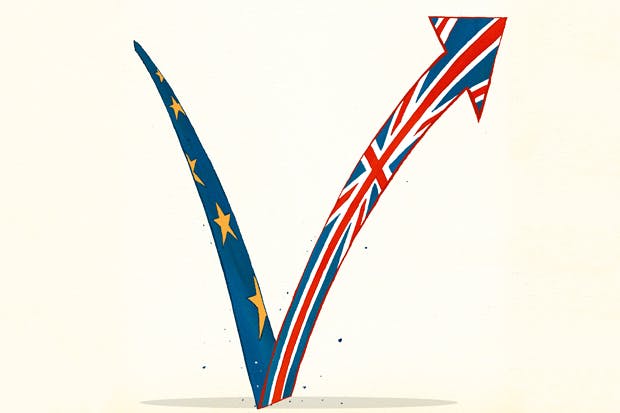Economies run on confidence — as Franklin D. Roosevelt observed when he told Americans, in his first inaugural address during the depths of the Great Depression in 1933, that they had ‘nothing to fear except fear itself’. If that confidence is lost, if people collectively start drawing in their horns, squirrelling money away because they fear turbulent economic times ahead, then recession can all too easily become a self-fulfilling prophecy. No serious economist would dispute this theory. The puzzle is why the UK economy, riddled with Brexit anxieties, is in such good health.
The Dutch prime minister said we were ‘collapsed’. The New York Times publishes frequent reports saying that Britain is falling apart, even that our country has ‘vanished’. Yet employers, consumers and workers do not seem to have received the message. Last month, it emerged that the government recorded its strongest surplus since 2000, collecting £2 billion more than it spent. July is always a strong month, but no one expected it to be quite this strong. Just as no one expected unemployment to be at a 43-year low, or income inequality to be around a 30-year low or consumers to be feeling quite so buoyant.
The latest IHS Markit Household Finance Index, a barometer of financial optimism, is at its second-highest level since 2009 — indicating a strong inclination to spend. The only point that it has been higher was at the beginning of 2015. Why should this be, given that the news is all about Brexit bringing the economy to the brink of disaster, hospitals running out of medicine and lorry queues tailing back 20 miles from Dover? The answer is that people are more inclined to observe their own growing incomes, see what is going on around them and to allow that to govern their sentiments.
Lack of trust in economic forecasts is hardly surprising. In recent years, they have seemed little better than horoscopes: the crash was missed, then all kinds of horror was predicted after the Brexit vote when, in fact, economic growth accelerated. The Treasury’s now-infamous warning, issued in May 2016, that GDP could fall by up to 6 per cent and unemployment soar by up to 800,000 in the first two years after a Brexit vote, will be studied by generations of economists as an example of hubris. It is the economic equivalent of the Iraq dossier, something that will damage government forecasting credibility for years to come.
The problem persists still, undermining credibility to a dangerous extent. The gloomy forecasts are made because they are based on subjective judgments — and economists are often blind to their own bias. They assume that consumers will share their sense of impending disaster, and are surprised when they don’t. In the second quarter, UK growth increased to 0.4 per cent — higher than had been forecast. With Eurozone growth slipping to 0.3 per cent, it’s harder to describe Britain as the laggard of Europe — especially given overall performance since the crash.
It is a mistake to read too much into any quarterly figures, but it is clear that Britain’s economy is not suffering as much as the doom-mongers insist. Exports are growing strongly — a trend that has outlived the initial plunge in the pound after the referendum two years ago. We exported £31 billion worth of goods in June, a 12 per cent increase on the same month last year. Almost all of the growth was accounted for by countries outside of Europe, with whom exports grew 23 per cent.
There is no shortage of problems: chiefly, a lack of workers. Companies are struggling to hire, especially with net immigration falling. This pain is, perhaps, necessary. For many years, employers have been able to rely on high-skilled, highly motivated and enthusiastic immigrants, which has meant they don’t invest in technology that allows work to be done by fewer, better-paid people. As a result Britain is one of the least mechanised countries in the developed world. Our problem at present is the opposite to that mentioned by Andy Haldane, the Bank of England’s chief economist, who warned this week that artificial intelligence would cause widespread job losses. For now, we have too many people doing low-paid jobs that machines ought to be doing.
If it’s harder to find high-skilled people, then employers may have to resort to training staff in greater numbers and paying them more. This is how economies are supposed to work. The food processing industry, for example, says more than 30 per cent of its staff are EU nationals. In 2004, it was 2 per cent. There may be a lag as employers start to invest in technology, and struggle to grow. But the process, done properly, could create higher-skilled, higher-paid jobs. In this way, the scales of economic power might tilt away from capital and back towards labour.
Those who voted for Brexit factored in a good deal of economic turbulence, which might yet come. It is still far from certain whether leaving the European Union will prove to be a boon for Britain. All will depend on how UK governments choose to exercise their new freedoms — whether they choose to liberalise trade and regulation, or whether they stick with a more protectionist, social democratic EU model. Either way, there are no grounds for the pessimism that seems to have pervaded so much of the public debate over Brexit. People can sense that, and are carrying on with their lives accordingly.
Got something to add? Join the discussion and comment below.
Get 10 issues for just $10
Subscribe to The Spectator Australia today for the next 10 magazine issues, plus full online access, for just $10.
You might disagree with half of it, but you’ll enjoy reading all of it. Try your first month for free, then just $2 a week for the remainder of your first year.














Comments
Don't miss out
Join the conversation with other Spectator Australia readers. Subscribe to leave a comment.
SUBSCRIBEAlready a subscriber? Log in